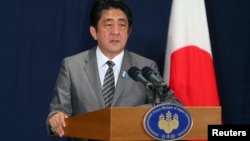Japanese Prime Minister Shinzo Abe says ongoing radioactive leaks at the Fukushima nuclear power plant should not threaten Japan's bid to host the 2020 Olympic Games.
Abe, who has been a stedfast supporter of nuclear power, made his comments on Wednesday, before leaving for the G20 summit in Russia. He told reporters he will then travel to Argentina to tell the International Olympic Committee the problem will be completely resolved in seven years.
"We are aware of concerns over the issue of contaminated water leakages at Fukushima," he said. "The government will take charge and will definitely resolve this problem. We are determined to take drastic measures of a maximum scale so that there are no problems by the 2020 Olympics."
Japanese authorities recently acknowledged that hundreds of tons of radioactive water are leaking out of the plant's storage tanks and into the nearby Pacific Ocean.
The ongoing leaks have raised doubts about efforts to clean up and decommission the facility, nearly two and a half years after it was hit by a massive earthquake and tsunami that triggered the world's worst nuclear disaster in 25 years.
Tokyo has recently stepped up its efforts to help the plant's operators, the Tokyo Electric Power Company, deal with the problem. On Tuesday, the government announced it will spend $470 million to help stop the leaks.
But there is still concern that the clean-up effort, which many estimate will take decades, will negatively affect Japan's bid to host the 2020 Olympics.
Tokyo is competing with Madrid, Spain and Istanbul, Turkey to host the games. The IOC is set to make a decision in Buenos Aires on September 7.
Abe, who has been a stedfast supporter of nuclear power, made his comments on Wednesday, before leaving for the G20 summit in Russia. He told reporters he will then travel to Argentina to tell the International Olympic Committee the problem will be completely resolved in seven years.
"We are aware of concerns over the issue of contaminated water leakages at Fukushima," he said. "The government will take charge and will definitely resolve this problem. We are determined to take drastic measures of a maximum scale so that there are no problems by the 2020 Olympics."
Japanese authorities recently acknowledged that hundreds of tons of radioactive water are leaking out of the plant's storage tanks and into the nearby Pacific Ocean.
The ongoing leaks have raised doubts about efforts to clean up and decommission the facility, nearly two and a half years after it was hit by a massive earthquake and tsunami that triggered the world's worst nuclear disaster in 25 years.
Tokyo has recently stepped up its efforts to help the plant's operators, the Tokyo Electric Power Company, deal with the problem. On Tuesday, the government announced it will spend $470 million to help stop the leaks.
But there is still concern that the clean-up effort, which many estimate will take decades, will negatively affect Japan's bid to host the 2020 Olympics.
Tokyo is competing with Madrid, Spain and Istanbul, Turkey to host the games. The IOC is set to make a decision in Buenos Aires on September 7.





